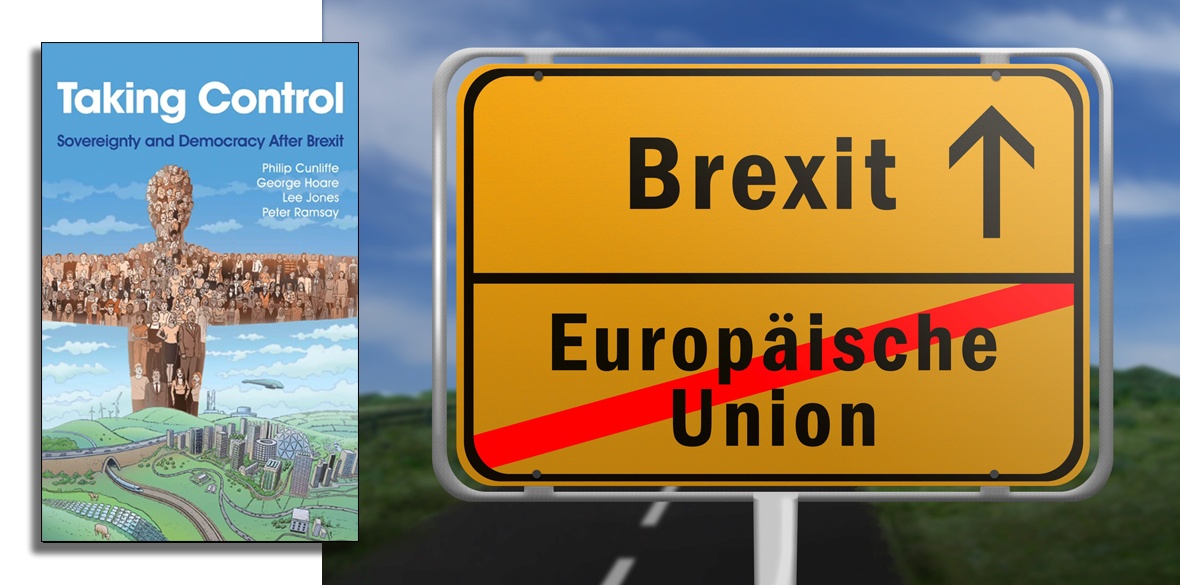This is the last article you can read this month
You can read more article this month
You can read more articles this month
Sorry your limit is up for this month
Reset on:
Please help support the Morning Star by subscribing here
Taking Control: Sovereignty and Democracy After Brexit
Cunliffe, P et al, Polity Press, £15.99
GIVEN the relative lack of serious attempts to understand Brexit — both the vote and why it was important for the future of the UK — any new book taking that as its object of analysis is most welcome. In addition, this book seeks to explore what “taking control” might mean through proposing a renewal of sovereignty and the nation state.
The authors correctly identify that the principal cause of the vote to leave in 2016 was the hollowing out of the political sphere and the growing gap between rulers and ruled under neoliberalism. Voting leave gave expression to a large section of the working-class’s anger at being ignored by both major parties for 40 years.
Furthermore, they situate this gap — which they call “the void” — as inherent to the European project, which they see as predicated upon the European elites’ desire to end the post-war settlement without having to be held responsible for decisions that would have been unpalatable to many voters. This necessarily involved the reduction of national sovereignty and the attendant ability to present what should have been contestable as inevitable — Thatcher’s “there is no alternative” writ large.
In this sense, the EU and its forebears are posited as an answer to the problem of democracy at a time when profits had started to reduce, and working-class power had grown.
It’s a compelling argument.
What is also useful is the systematic dismantling of the tired analyses of the electorate made in much of the corporate media and by the majority of the political class in the wake of the seismic shock of June 2016, whereby Leave voters were routinely assumed to be racist and stupid. The authors see those positions as another effect of the decline of popular sovereignty and, by extension, nationhood — a country in which one demographic does not recognise or understand the others.
It’s the emphasis upon nationhood that is significantly less compelling, for the simple reason that it assumes there to be shared interests between competing groups — specifically, between labour and capital — as, to be fair, the authors allow. Unfortunately, the reason they give is that there is no organised labour movement capable of challenging capital.
This leaves them open to being charged with the very defeatism that they quite correctly accuse the centre left of, basing their view of the EU as following Jacques Delors’s “Social Europe” speech to the TUC in 1988, when a weakened labour movement tied its colours to the EU mast.
Why?
Because the context of the Brexit vote was, of course, the Corbyn project, and the first possibility in a generation of at least a return to social democracy and perhaps more.
The weakest sections of the book concern what was happening in Labour from 2015-19. While they correctly identify some of the reasons why the drift away from honouring the vote began, they also put this down to the “exhaustion of British socialism.” The renewed class struggle being waged by workers at present belies this lazy assumption.
Moreover, while it is true that the Labour Party collapsed under the weight of the contradictions that Brexit presented for it, it is also the case that the particular fear of the British state was a Corbyn government outside the EU, which possibility they don’t discuss. Instead, they see left and right as exhausted categories which, given the state’s reaction to the possibility of a Corbyn government would suggest was a premature judgement at the very least.
Indeed, while their description of member-statehood as the form that countries have taken to void national sovereignty is accurate, the problem for a Marxist reader is that their view of the nation state (as they see constituted in the post-war era in the era of social democracy) is overly romantic. The state has always stood above society rather than as the representative of it.
While they are at pains to say that they don’t want to go back to that time, it’s difficult to see how their vision of new sovereign nations being forged sits with the continued freedom of capital to cross borders. Brexit didn’t end that, and neither will the break-up of the EU, though the latter would clearly be a start.
There is more to be said and, indeed, more with which to disagree in the book. But overall, it is a worthy contribution to our understanding of the EU, and to attempts to escape it.










